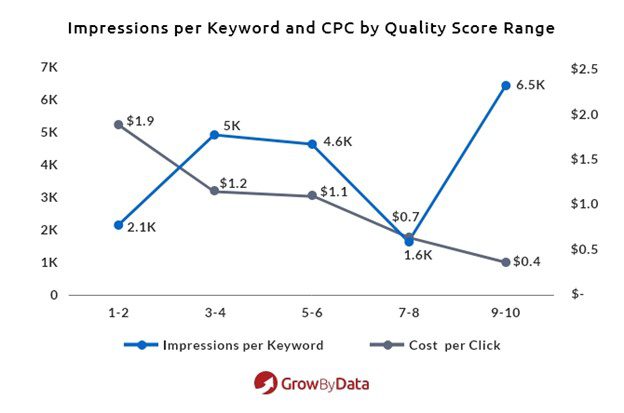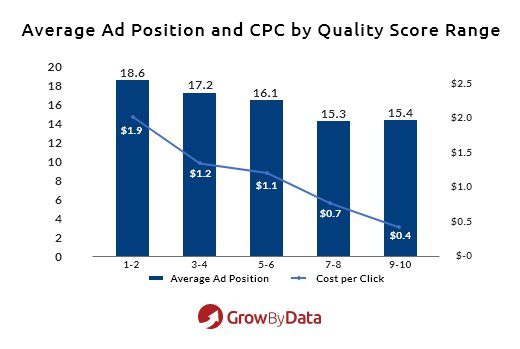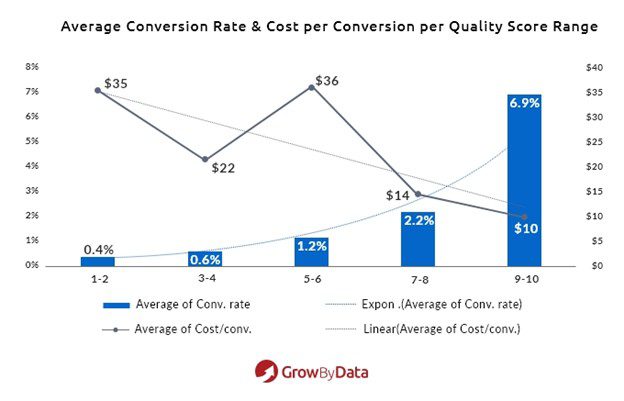 Quality Score is a grading system that Google uses to rate the quality and relevance of an ad with a search keyword. Google is always striving to improve the quality of the ads listed on their websites to improve the user experience, and quality score is a reflection of that.
Quality Score is a grading system that Google uses to rate the quality and relevance of an ad with a search keyword. Google is always striving to improve the quality of the ads listed on their websites to improve the user experience, and quality score is a reflection of that.
Google strives to present ads that are most relevant to a user’s searches, resulting in more clicks on ads and advertisers paying a cost per click (CPC) associated with that search. Google is also keen on presenting ads that have the highest probability to convert into sales for the advertiser.
Quality Score is based on a scale between 1 and 10, with 1 being the lowest score and 10 being the best score possible. An ad’s Quality Score is an aggregated estimate of the overall performance in the ad auctions.
Why is Quality Score Important?
As ads start converting, an advertiser is rewarded with a higher Quality Score, in turn amplifying ad campaign optimization processes.
Google calculates a Cost Per Click based on ad Quality Score and Ad Rank. This implies an advertiser can spend less to get a higher Ad Rank position.
How Does Google Determine Quality Score?
There are three main factors that Google uses to estimate your Quality Score:
- Expected Click-Through Rate (CTR): How likely is someone to click on your ad if it shows up for the specific keyword a user may search?
Google does not want to show irrelevant ads to their users. Things that can affect your click-through rates are:
- Not utilizing ad extensions on your ads
- Not targeting ad campaigns to the right user groups
- Pricing your products either too high or too low from your competitors.
- Ad Relevance: Does it make sense for Google to show your ad for that specific keyword?
This measures how closely related the keyword is to your ads. Google gives a status of below average, average, and above average regarding the relevancy of the ad to your keyword. It is important to have a status of average or above average to get chosen by Google for the auction. Things that affect your ad relevancy are:
- Your product feed — Is all the information on your feed 100% correct?
- Image enrichment — Do your image quality and specs meet Google’s requirements?
- Product title optimization — Are your product titles optimized per your customer’s search intent?
- Landing Page Experience: Is the information provided on your landing page the same as what is being offered on your ad itself?
Google checks to make sure that your website’s landing page is relevant to the user that clicked on your ad, and that the user gets a seamless experience while navigating through the landing page. Make sure your landing page is clear, useful and relevant to the customer’s search.
Landing page experiences are affected by the page load speed and the quality of the pages on different devices. It is also crucial to enrich the data on your landing pages.
How Does Quality Score Impact Ad Performance?
We analyzed Quality Score data on 2,182 keywords from sellers in the health and beauty category to see how Quality Scores affected the cost per clicks, cost per conversion and ad ranking.
As shown in the graph below, the number of impressions per keyword is significantly higher on the ads with a Quality Score between 9 and 10, with the CPC being much lower.

Quality Score Optimizes Ad Rank with Lower Cost per Click (CPC)
We looked at the effect of Quality Score on Ad Rank. Our data showed ads that have a higher position in the ad auction typically have a higher Quality Score, as depicted in the graph below. The graph also shows that CPC is decreased as Quality Score is increased, thus improving the ad’s ranking.

Quality Score Creates Better Sales Conversion
The final goal is conversion to sales and generating revenue. Therefore, we looked at the data on the effect of Quality Scores on conversions and cost per conversion. Per the graph below, we found that cost per conversion is much lower if you have a higher Quality Score. The average cost per conversion on keywords with a score of 9 to 10 is $10, whereas keywords with scores of 1 to 2 is $35. Ads with a score between 9 and 10 also had conversion rates of almost 7%, which is exponentially higher than the rest.

In Conclusion: How can you Best Improve Your Quality Score?
- Improve your CTR:
- One of the best ways to improve CTR is by using ad extensions. They help differentiate your ad and stand out in the ad auction.
- Knowing your exact target market can help you target specific areas/regions or audiences that may be more likely to click on your ads.
- Use repricing tools for dynamic pricing to make sure your prices are comparable to, if not cheaper than, your competition.
- Boost your ad relevance:
- Optimize your product feed with the correct information such as GTIN, image, title, attributes of the product, description, product category, etc.
- Enrich your product images with the right Google specifications.
- Understand the intent of your customers to write better and more relevant product titles and descriptions.
- Analyze the top ranked ad content, understand the factors affecting Google ad impression and position, then optimize your ad’s content.
- Design a positive landing page experience:
- The information provided in the page is relevant.
- Its load speed is fast and easy to navigate.
- It is optimized on all devices, such as mobile, tablet and desktop.
- The page data is enriched (i.e. remove inaccurate, outdated and irrelevant information, and constantly update obsolete records with correct and up-to-date information).
Final Thoughts on Quality Scores
Features that influence Quality Score play a crucial part in how Google decides where the ad is ranked and which ads show up in the ad auction. Next to the ad bid, Quality Score is the most influential metric in Google Adwords. Sometimes, a higher Quality Score can be even more influential than a higher bid amount in the ad rankings.
Ad Intelligence gives unprecedented insights into competitors and their ad contents, such as product title, product image, product attributes, landing URL, price, ad extensions, shipping labels, etc. These factors influence Google Quality Scores and affect ad rankings. Having this level of granular data and information can enhance the quality of your ads, improve your Quality Scores and lower your ad spend.
To learn more about Ad Intelligence, click here.
Prasanna Dhungel is Co-founder and Managing Partner of GrowByData, an enterprise retail data platform that offers retailers, manufacturers and advertising agencies competitive data for merchandising, advertising, pricing, channel management and corporate strategy. Dhungel drives the content marketing initiatives and has architected the firm’s data strategy and drives its growth. He has 20-plus years’ experience in big data. Previously, he was VP at Valence Health (now Evolent Health) and at D2Hawkeye (now Cotiviti Health). He has an MBA from Kellogg School of Management, MEng from Princeton University and BS with Honors from Cornell University.




